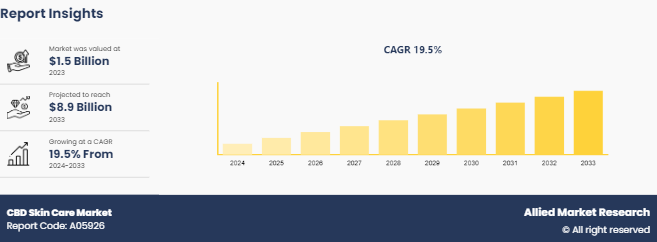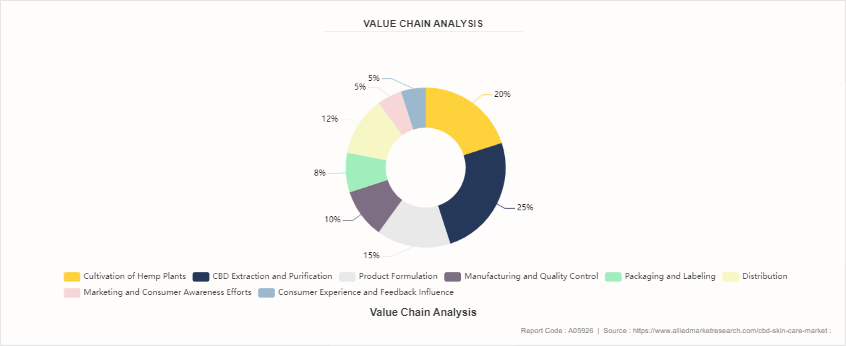CBD Skin Care Market Research, 2033
Market Introduction and Definition
The global CBD skin care market was valued at $1.5 billion in 2023, and is projected to reach $8.9 billion by 2033, growing at a CAGR of 19.5% from 2024 to 2033. The CBD skin care market has emerged as a rapidly growing segment within the broader skincare and wellness industry. Cannabidiol (CBD) , a non-psychoactive compound derived from the cannabis plant, has gained significant attention for its potential therapeutic benefits. The incorporation of CBD into skincare products is driven by its purported anti-inflammatory, antioxidant, and anti-aging properties. These benefits appeal to consumers seeking natural and holistic approaches to skincare. CBD is incorporated into various skincare products, including creams, lotions, serums, masks, and balms, due to its purported anti-inflammatory, antioxidant, and anti-aging properties. These products address skin concerns such as acne, eczema, psoriasis, and general skin hydration and rejuvenation.

Key Takeaways
The CBD skin care market study covers 20 countries. The research includes a segment analysis of each country in terms of value ($Million) for the projected period 2023-2033.
More than 1, 500 product literatures, industry releases, annual reports, and other such documents of major CBD Skincare industry participants along with authentic industry journals, trade associations' releases, and government websites have been reviewed for generating high-value industry insights.
The study integrated high-quality data, professional opinions and analysis, and critical independent perspectives. The research approach is intended to provide a balanced view of global markets and to assist stakeholders in making educated decisions in order to achieve their most ambitious growth objectives.
Key Market Dynamics
Increasing awareness about the potential benefits of CBD, such as its anti-inflammatory, antioxidant, and anti-aging properties, drives consumer interest and demand for CBD-infused skincare products. Educational initiatives and positive media coverage contribute to this growing awareness., increasing the CBD Skin Care Market size
As consumers become more health-conscious and seek natural alternatives to synthetic ingredients, the demand for skincare products featuring natural components like CBD is on the rise. This shift towards organic and eco-friendly products fuels market growth, increasing the CBD Skin Care Market Share.
The legal status of CBD varies by region, with some areas having stringent regulations or unclear guidelines regarding its use in skincare products. This regulatory uncertainty can create challenges for market expansion and product development and negatively affecting the CBD Skin Care Market growth.
CBD-infused skincare products often come with higher price points compared to traditional skincare items due to the cost of CBD extraction and production. Additionally, limited availability in some regions can hinder market penetration and consumer access.
There is significant potential for innovation in CBD skincare products, including the development of new formulations, delivery methods, and product types. Brands can capitalize on this opportunity by introducing unique and effective products that meet diverse consumer needs.
As regulatory frameworks become more favorable and consumer acceptance grows, there are opportunities to expand market reach into new regions and demographics. This includes exploring international markets and targeting niche consumer segments interested in holistic and natural skincare solutions.
Value Chain of CBD Skin care Market
The value chain of the CBD skin care market involves several key stages, starting with the cultivation of hemp plants, which are the source of cannabidiol (CBD) . After harvesting, the hemp is processed to extract and purify CBD oil using methods like CO2 or ethanol extraction. This purified CBD is then formulated into various skincare products, including creams, serums, and masks, with additional ingredients to achieve desired properties. During manufacturing, the products undergo rigorous quality control to ensure safety and effectiveness. They are then packaged and labeled with essential information for consumer use. According to CBD Skin Care Market forecast, distribution occurs through channels such as specialty stores, online platforms, and beauty retailers, supported by marketing efforts to drive sales and raise consumer awareness. Finally, the consumer experience and feedback play a crucial role in influencing product improvements and future development, completing the value chain from cultivation to market.

Market Segmentation
The CBD skin care market segmentation is categorized on the basis of product type, form, distribution channel, and region. By product type, CBD skin care market is categorized into oils, lotion and creams, masks and serums, bath and soaps and others. By form, it is bifurcated into hemp and marijuana. By distribution channel, it is classified into departmental stores, e-commerce, hypermarkets/supermarkets, retail pharmacies, and others. Region-wise, it is analyzed across North America (the U.S., Canada, and Mexico) , Europe (Germany, France, Spain, Italy, and Rest of Europe) , Asia-Pacific (China, India, Japan, Australia, South Korea, and Rest of Asia-Pacific) , and LAMEA (the Middle East, Latin America, and Africa) .
Industry Trends
There is a growing consumer preference for skincare products with natural and organic ingredients. CBD, known for its potential therapeutic benefits, aligns with this trend as consumers increasingly seek products that avoid synthetic chemicals and offer holistic benefits. This shift towards natural and sustainable ingredients is driving the expansion of the CBD skin care market. According to the data from the National Institutes of Health (NIH) indicates that consumer interest in CBD products has increased, with 33% of U.S. adults reporting use of CBD products for various health and wellness purposes, including skincare.
The wellness and self-care movement has gained momentum, with consumers prioritizing products that promote overall well-being and mental health. CBD’s association with relaxation, stress relief, and skin health contributes to its appeal within this trend. As self-care routines become more integral to daily life, CBD-infused skincare products are positioned to benefit from this growing wellness and selfcare segment. Moreover, increasing awareness and education about the benefits of CBD are crucial for market expansion. As consumers become more informed about CBD’s potential advantages for skin health, they are more likely to incorporate these products into their skincare routines. Educational initiatives by brands and increased media coverage contribute to this trend.
Competitive Landscape
The key players operating in the global CBD Skin Care industry include Kiehl’s LLC, Cannuka LLC, Leef Organics, Medical Marijuana Inc., Lord Jones, Kapu Maku LLC, VERTLYBALM, Elixinol Global Limited, Fab CBD Company, and Endoca LLC. Other CBD Skin Care market players identified in the value chain are L’Oreal, Varm Cosmo, L’Eela, Apothecanna, Charlotte’s Web Holdings, Kana Skincare, Josie Maran Cosmetics, Cronos Group, CBD Biotech, and Estee Lauder.
Recent Key Strategies and Developments
In September 2021, a major new skincare range based on CBD oil was launched at the recent Belleza Y Salud event in Bogota, Colombia, Called Kuida Colombia.
In April 2020, Kiehl’s launched cannabis Sativa seed oil herbal concentrate for stressed or spot-prone skin.
In May 2019, Europe’s first luxury CBD e-commerce site launched high-quality cannabis-based beauty and hygiene products in the European market.
Key Benefits For Stakeholders
- This report provides a quantitative analysis of the market segments, current trends, estimations, and dynamics of the CBD skin care market analysis from 2024 to 2033 to identify the prevailing CBD skin care market opportunities.
- The market research is offered along with information related to key drivers, restraints, and opportunities.
- Porter's five forces analysis highlights the potency of buyers and suppliers to enable stakeholders make profit-oriented business decisions and strengthen their supplier-buyer network.
- In-depth analysis of the CBD skin care market segmentation assists to determine the prevailing market opportunities.
- Major countries in each region are mapped according to their revenue contribution to the global market.
- Market player positioning facilitates benchmarking and provides a clear understanding of the present position of the market players.
- The report includes the analysis of the regional as well as global CBD skin care market trends, key players, market segments, application areas, and market growth strategies.
CBD Skin Care Market Report Highlights
| Aspects | Details |
| Market Size By 2033 | USD 8.9 Billion |
| Growth Rate | CAGR of 19.5% |
| Forecast period | 2024 - 2033 |
| Report Pages | 255 |
| By Product Type |
|
| By Form |
|
| By Distribution Channel |
|
| By Region |
|
| Key Market Players | Leef Organics, Elixinol Global Limited, Lord Jones, Cannuka LLC, Kiehl’s LLC, VERTLYBALM, Medical Marijuana Inc, Kapu Maku LLC, Endoca LLC, Fab CBD Company |
The key players operating in the global CBD Skin Care industry include Kiehl’s LLC, Cannuka LLC, Leef Organics, Medical Marijuana Inc., Lord Jones, Kapu Maku LLC, VERTLYBALM, Elixinol Global Limited, Fab CBD Company, and Endoca LLC.
The global cbd skin care market was valued at $1.5 billion in 2023, and is projected to reach $8.9 billion by 2033, growing at a CAGR of 19.5% from 2024 to 2033.
The largest regional market for CBD skin care is North America.
The leading application of the CBD skin care market is anti-inflammatory and antioxidant skincare treatments.
There's a growing demand for CBD skincare products that emphasize natural, organic, and sustainable ingredients.
Loading Table Of Content...



